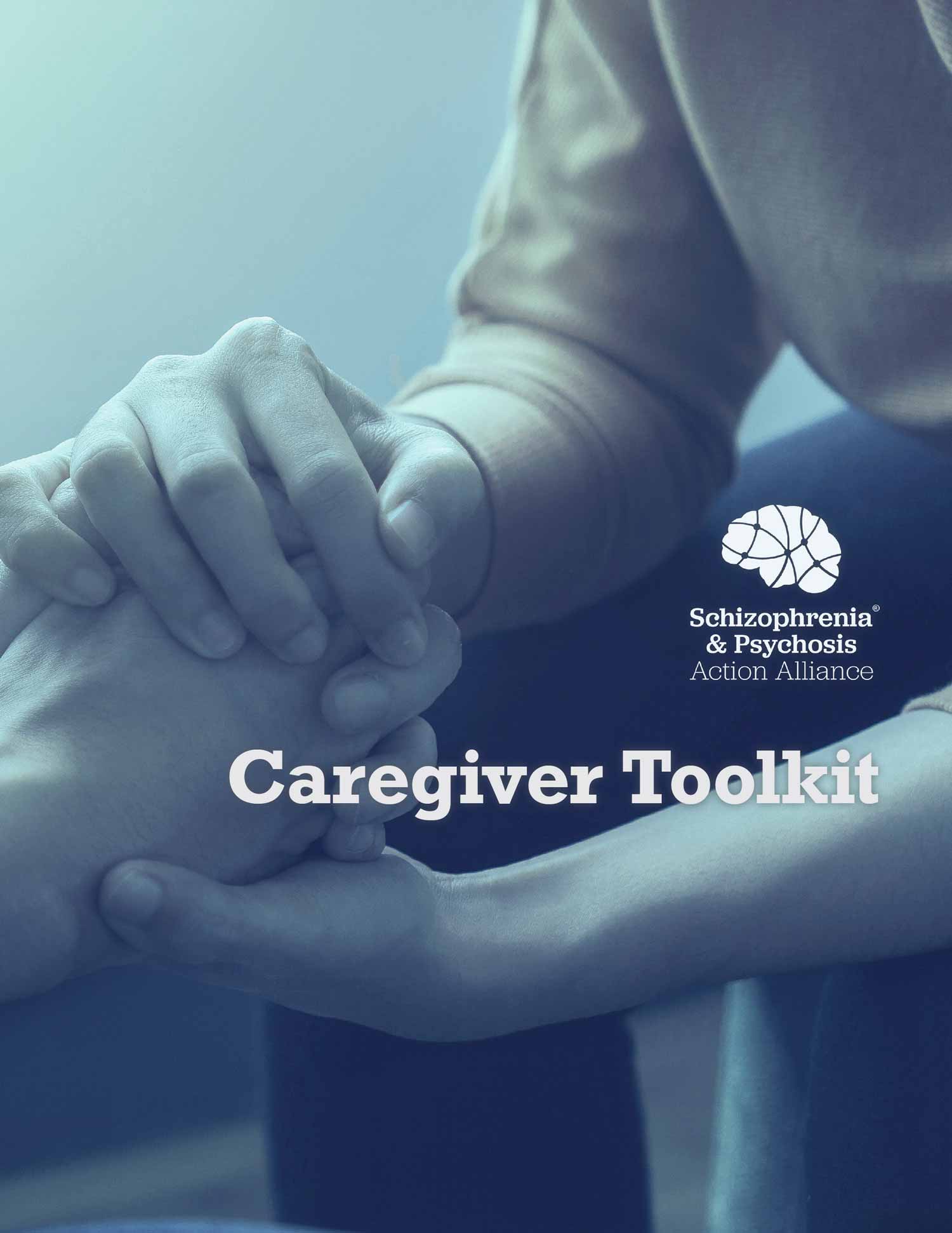Caring for someone with schizophrenia is a profound journey of resilience and love. We stand with you and are here to support you on your caregiving journey:


A toolkit can include anything that helps you manage and assist with an illness. Often, they contain ideas, resources, templates, documents—anything that assists with helping your loved one. Here are some ideas for what to include in your kit:
Educating yourself on your loved one’s illness is an important tool for helping them. Psychiatric brain disorders are diagnosed via the Diagnostic Statistical Manual (DSM), now in its fifth version. The DSM identifies brain illnesses and their symptoms as experienced over time. One important aspect of the DSM is that diagnosable illnesses have ICD codes, and those codes are identified on billing from your doctors. ICD codes determine reimbursements from insurance and how much of the treatment is covered. The DSM is a good place to start to learn what symptoms are related to which illnesses.
There are many helpful books on brain disorders. You can find some of our suggestions here.
Education can also come from other avenues, including:
Once you know better, you do better. Becoming educated on your loved one’s illness can help reduce anxiety and increase understanding of symptoms and behaviors. Understanding complex brain illnesses doesn’t take a medical degree. Read, ask, and learn. It’ll help you build your toolkit.
Keeping a medical journal can be a helpful tool. You can use our Health StoriesTM app or keep a handwritten journal documenting appointments, symptoms, medications, doses, therapy instructions, questions for doctors and clinicians, and instructions for certain situations.
Dealing with any illness can be daunting and upsetting. Carrying a medical journal to appointments can help you remember later what you may have been too upset to understand at the time.
A journal can also be used to partner with your loved one’s doctors. In the world of brain disease, there is often hostility and negativity toward parents and family members. Keep the meetings professional and show that you are a real partner in your loved one’s journey. Take notes during meetings and reiterate what you’ve been told by clinicians and other professionals. Clinicians appreciate an interested and helpful family member.
Psychiatric brain disorders are our best kept secrets. Society has conditioned us not to talk about them, adding to the isolation of the journey. However, when you do reach out, you’ll find allies and a support system. You may uncover a family history of brain illness and others who have endured similar journeys and also felt alone. Be honest about your family member’s illness and seek support from those close to you. It can be a great comfort to both you and your loved one.
Brain health crises are often preceded by periods of turmoil and chaos. Prepare a plan that includes:
Your goal during a brain health emergency is to stabilize the situation and get the person to professional help as quickly as possible. Below are some general guidelines for handling a psychiatric crisis or responding to someone in the grips of psychosis spectrum disorders:
If there is a threat of suicide, assume it is serious and treat it as a danger to the person’s life. A previous suicide attempt increases the likelihood that the person will act on the threat.
In a private, calm setting, ask whether the person is thinking about suicide. Your questions can be indirect like, “Do you ever think you should never have been born?” or more direct like, “Do you feel like you want to die?”
If the answer to these general questions is yes, follow up and ask about specific suicide plans. When do they plan to commit suicide? How? Have they already acquired the means like pills or weapons?
Determine the imminence of danger based on their answers. A college freshman who describes a suicide plan for graduation day in four years is probably not in imminent danger. A college senior who is graduating the next day is. Act accordingly.
Contact the person’s mental health or medical providers and repeat exactly what the person told you.
Hide all vehicle keys and any means that could be used for self‐harm like medications, knives, guns, and ropes.
Keep the person sober. Successful suicide rates increase when there is a higher blood alcohol level. This is because intoxicated people are likely to attempt suicide using more lethal methods.
Do your best to persuade the person to get help voluntarily. Dial the suicide prevention hotline number, drive to the clinic, take a taxi to the emergency room. Do whatever is necessary to get them to help. Call 911 if the suicide attempt appears imminent.
What is HIPAA Waiver of Authorization?
It is a legal document that allows an individual’s health information to be used or disclosed to a third party. The waiver is part of a series of patient-privacy measures set forth in the Health Insurance Portability and Accountability Act (HIPAA) of 1996.
Patient information covered under HIPAA, called protected health information (PHI), is information that can be linked to a specific individual held by a covered entity, such as a health insurer, healthcare provider, or healthcare clearinghouse.
It’s important to get a HIPAA waiver signed while your loved one is healthy. Due to their disease, your loved one may often refuse to allow communication with families, especially if coming to care involuntarily.
If you do not have a waiver signed at the time of a crisis, however, HIPAA does not prevent families from communicating helpful information on symptoms and recent events to doctors and clinicians.
What is an Advance Medical Directive?
An advance medical directive is a legal document providing medical direction for a patient who may be unable to make medical decisions for themself. It can cover anything from who can ride in an ambulance to what medications a doctor can prescribe.
To complete an advance directive, download a form through your state’s department of health and human services while your loved one is healthy. Keep it handy and know where it is. Provide the advance directive to be included in their medical record.
Seeking Guardianship
Consulting a disability or mental health attorney can help answer questions you may have about seeking guardianship for your loved one. The requirements and legal filings are different for each state. Guardianship can cost money and time, so prepare for this by gathering documentation before crises that will help your case. Guardianships can be temporary or permanent. If your loved one is able, discuss the possibility of guardianship with them and share ways this can help protect them medically and financially.
Organizing Disability and SSDI
Disability is a federal benefit for citizens who are unable to work or care for themselves at a level appropriate for their age. There is a federal disability application that is fast tracked to assist brain disorder patients from becoming homeless. This application is called SOAR. Having a social worker or lawyer help you complete the application ensures it has the pertinent information required for disability. Schizophrenia and related disorders are the largest cause of disability in the United States. It can be an arduous process, and the process becomes more difficult as your loved one ages. Select a representative payee ahead of time (someone willing to help with the financial aspects for your loved one). The federal SOAR application also comes with Medicaid or Medicare, providing free or low-cost invaluable help with access to medical care for patients disabled by psychosis spectrum disorders.
The SOAR application is available via SAMHSA, the Substance Abuse and Mental Health Services Administration.
LEAP® is the leading methodology to partner with your loved one on their illness and gain their trust. This method was invented by Dr. Xavier Amador as he assisted his own brother who had schizophrenia and suffered from anosognosia (lack of awareness of illness).
As many families know, their loved one often says they aren’t sick and don’t need help. The LEAP® method teaches families, friends, health professionals, and criminal justice personnel how to build trust and partner with someone experiencing psychosis spectrum disorders to help them to accept and be involved in their care. Dr. Amador’s method is available via personal training sessions through his many YouTube videos and via his acclaimed book, “I’m Not Sick, I Don’t Need Help.”
The tools you learn in LEAP® can be used in any relationship, but they are particularly useful when your loved one cannot perceive that they need medical assistance or medication.